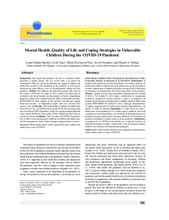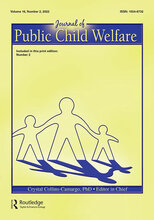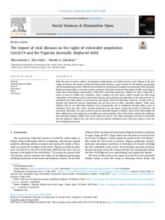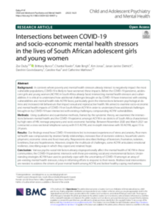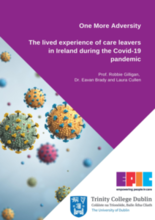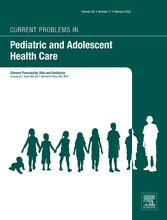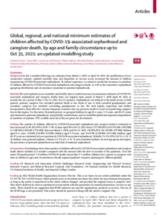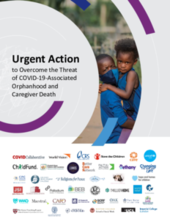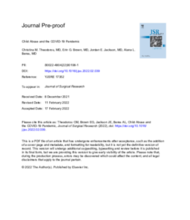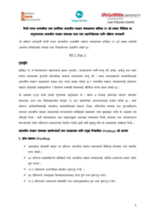This section includes resources on the response to the COVID-19 pandemic as it relates to child protection and children's care.
News on COVID-19 and Children's Care
Webinars and Events on COVID-19 Response
Displaying 41 - 50 of 750
The aim of this study is to analyse the consequences after one year of the pandemic on a group of children and adolescents assessed at the beginning of the pandemic in 2020 and to determine the most effective ways of psychologically coping with this pandemic.
This qualitative interview study assessed the pandemic’s impact on the educational experiences of foster youth in the United States from the perspectives of their caseworkers. Participant caseworkers discussed how the pandemic affected the academic progress and social/emotional development of youth in foster care and highlighted some challenges of online learning.
This article examines the challenges that internally displaced children face in the midst of COVID-19. The article investigates the level of protection that the displaced children have and what social and medical mechanisms have been put in place to cater for them during the pandemic.
The purpose of this study was to examine socio-economic and mental health impacts of COVID-19 on South African adolescent girls and young women (AGYW) in order to understand how additional challenges brought on by COVID-19 have intersected with existing challenges, compounding AGYW vulnerabilities.
This study explores the lived experiences of care leavers in Ireland during the COVID-19 pandemic.
This review will first highlight systemic/institutional inequities accentuated by the pandemic for subgroups of vulnerable children. These include Asian Americans and Pacific Islanders (AAPI), Black and Latinx, Indigenous populations, refugee communities, those with disability and LGBTQIA+ youth.
At least 5 million children have lost a parent or caregiver due to #COVID19 since March 2020, updated figures suggest. The authors urge actions to prioritise affected children, incl. economic strengthening, enhanced community and family support, and education.
An estimated 6.7 million children have suffered from COVID-19-associated orphanhood and caregiver death in the past two years (as of January 15, 2022). This number is rapidly growing: every 6 seconds another child loses a parent or caregiver. This report, issued by dozens of leading international NGOs, outlines the magnitude of loss globally due to COVID-19 and presents tangible steps that the U.S. government can take to support children and families.
The COVID-19 pandemic had widespread effects, including enhanced psychosocial stressors and stay-at-home orders which may be associated with higher rates of child abuse. The researchers aimed to evaluate rates of child abuse, neglect, and inadequate supervision during the COVID-19 pandemic.
यस अध्ययनले सातवटा केन्द्रित देशहरूमा २१ अर्ध-संरचित अन्तर्वार्ताहरू समावेश गरी गुणस्तरीय अनुसन्धान अध्ययन सञ्चालन गरेर निजी रूपमा सञ्चालित र वित्त पोषित आवासीय हेरचाह संस्थाहरूको सानो संख्यामा COVID-19 को प्रभावको अन्वेषण गर्दछ।

